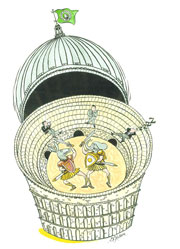THE LEGISLATURE GAME was once a prestigious one, like polo or thoroughbred racing. It was an Olympiad played every other year, and everyone flocked to the galleries to watch the spectacle. The players, chiefly politicians, were respected by the spectators and regaled by the press. They lived lavishly, but they set and broke records and won great prizes for their fans, bringing honor to themselves and the game.
One day—no one quite remembers when—the game started to change. It turned inelegant and became like bowling. The caviar turned to cheese balls, champagne to root beer. Some of the new players would rather bring glory to God than to their own teams. The new breed didn’t drink, smoke, or chase women—if only because about half of them were women.
Many fans were happy to see the new breed. They argued: What was so great about the old days? The game was conducted by big-bellied white guys who drank their way through the games, never paid for their own meals, huddled in secrecy, and threw games for tawdry sums of money.
Most of the old players got fed up and retired. Others were defeated. A few went to jail. Each year the game got harder, the rules more complex. The prizes became booby prizes at worst, consolation prizes at best. The players had to settle for less—just finishing the game in the time allotted became the prize. The spectators got bored, then angry, then bored again; then they lost interest altogether.
Still the game goes on. Starting on January 8, Governor Gary Locke, 98 elected members of the state House of Representatives, 49 elected state senators, an army of staff members, a platoon of paid lobbyists, too few citizen activists, and hardly any just regular folks start playing the 2001 version of the Legislature Game. For a minimum of 105 days, all parties will fight it out and, at the end, will deliver, at minimum, a budget of around $46 billion that will run state government for the next two years.
The voters have made the game much more challenging by evenly dividing the teams. The House has 49 Democrats and 49 Republicans. This tie means there’s two of everything in the House leadership—co-speakers, committee cochairs, two points of view that presumably must find consensus, or not. Over in the Senate, Democrats hold a tenuous 25-24 majority. The Democrats’ biggest advantage is in the governor’s mansion: Locke was just reelected by a large margin.
Can the governor take advantage of his “mandate”? Will bipartisanship help everyone just get along? Or will gridlock settle in and the state’s problems go unaddressed? Here’s your up-to-the-minute Seattle Weekly guide on who the players are, what is at stake, and how the game is played:
The political players
The legislative players are underpaid, overworked, and underappreciated. Few citizens know who they are or what they do. Some are assholes and some are opportunists, but most are doing thankless public service for the sake of doing public service. They’re paid $32,000 a year, which one legislator says comes out to about $5 an hour and “doesn’t pay for the bullet holes.”
Here are the principals:
Democratic Senate Majority Leader Sid Snyder has worked nearly every job in the Capitol—from elevator operator to senator—in a career spanning more than 50 years. A rare rural Democrat, he knows where the bodies are buried and has buried a few himself. He represents the old civility and is a patient compromiser, but he’s also one tough cookie. In 1997, when majority Republicans suspended Senate rules to ram something down the throats of the Democratic minority, he quit in disgust. He was talked into coming back by a large bipartisan delegation.
His counterpart is GOP Senate Minority Leader Jim West, who ran for mayor of Spokane this summer. Many Republicans were angered by West’s willingness to give up his powerful position in the Legislature for a place in the fractious Spokane City Hall. Humiliatingly, however, he lost in the primary, so he’s back in Olympia. He’s a smart and experienced number cruncher who was chief budget writer back in the Republicans’ better days. When he first became minority leader, his reputation for vindictiveness, temper tantrums, and door slamming made some Senate Republicans doubt whether he could bring the caucus together and get them back into the majority. But West has proven himself able to work well with others, although the GOP is still in the minority.
Clyde Ballard, Republican House co-speaker, is a religious conservative from Wenatchee known as the “iron butterfly” by his colleagues because of his ability to keep discipline in his ranks and coexist affably with Democratic House Co-Speaker Frank Chopp, the first speaker from Seattle in 38 years. Chopp is the head of the Fremont Public Association, a social service agency, and one of the greenest Democratic lawmakers ever to win such a high post. Chopp and Ballard are philosophically an odd couple, but most of the time the House gridlock is sustained and maintained in a friendly manner.
Gary Locke: The governor won big in November, though it may have been only because of his new haircut. Locke was also helped when his opponent, John Carlson, kicked off his campaign with a fund-raiser headlined by Rush Limbaugh. Locke has already proposed a $46.3 billion budget that takes care of road improvements and answers the voters’ call for more education dollars, but contains deep cuts in social and health programs, an aspect that disturbs Democrats. Republicans are huffing and puffing that Locke’s budget runs around a voter-approved cap on state spending and fails to mention a way to fund all the proposed programs fully, leaving the wet work to the hapless Legislature. “I’m incredibly disappointed in the governor,” says West, “for not giving us some guidance. Again, it’s a lack of leadership.” West, of course, is not known for being easily led, especially by Gary Locke.
Democratic leader Sid Snyder says, “It’s an ugly budget; it shows how serious the problems are. When we leave, it’ll still be with an ugly budget, only different than this one.”
Free agents
Senator Tim Sheldon, whose handlebar mustache makes him look like a tenor in a barbershop quartet, has never acted like a Democrat, although technically he is one. He endorsed Slade Gorton for the US Senate and George W. Bush for president, and he hosted a fund-raiser for Doug Sutherland, a Republican candidate for public lands commissioner.
When it became obvious how close the margin in the Senate would be, Sheldon coyly said he was “looking at” becoming a Republican or an independent, an act that would strip Democrats of their Senate majority and the power that goes with it. Senate Majority Leader Snyder said publicly that if Sheldon became a Republican it would be “devastating”; if he became an independent it would be “chaotic.” Sheldon, from a rural district, has always voted conservatively and had been passed over for committee chair positions because of it. His threat to switch parties was seen as a not-so-veiled bid for a chair position, though Sheldon denied it.
Finally, Senate Dems had a secret come-to-Jesus meeting with Sheldon. They created a new committee, Economic Development and Telecommunications, and made him chair, thus ensuring that their tenuous majority would be safe. Whether or not Sheldon can be trusted to be a Democrat other than in name only is uncertain at best.
Tim Eyman, the initiative-wielding populist, is arguably the most successful citizen activist the state has ever seen. He doesn’t even need to show up at the Legislature: His dogged microwave democracy or threats thereof hog the agenda, putting legislators between the dog and the hydrant and making the governor jump like a trained seal. In 1999 he spearheaded Initiative 695, which gutted the car-tabs tax and blew a huge hole in the state budget, particularly in the transportation area. In November voters approved his Initiative 722, which limits the growth of property taxes.
Next on Eyman’s tax-cutting agenda are two new initiatives. The first would require local governments to go to the voters for all new tax increases; the second would limit the growth of state tax revenues to the rate of inflation, with any excess to be returned to the taxpayers as still-lower property taxes.
Eyman doesn’t need to get the signatures to put these bombs on the ballot. Legislators know that property tax relief is hanging over their heads; if they want to avoid another raggedy initiative that further hamstrings their ability to govern, they must consider the formidable Eyman constituency in their calibrations.
The money players
Lobbyists are called the Third House; they’re the most misunderstood players in the game and certainly the most despised by the public. There are hundreds of them, representing every special interest imaginable: Boeing, public defenders, Planned Parenthood, religious groups, Microsoft, unions, environmentalists, individual cities and counties, farm groups, homeless advocates, NARAL, gamblers, liquor interests, and on and on. They gather like paid mourners in their expensive suits in an area called Ulcer Gulch. They pace, murmuring among themselves, talking endlessly into cell phones, buttonholing passing members.
Some are volunteers, while others are paid. Some represent one entity; others represent the interests of multiple clients. They follow issues full-time, something few citizen lobbyists are able to do.
These are peanuts and Diet Coke times in the Legislature. Gone are the days when lobbyists entertained legislators with whiskey, women, and lavish parties. There are probably sellouts and other travesties, but they’re subtler than in the past and conducted more clandestinely. Lobbyists nowadays are mostly sources of information, expert in the interests they represent, providing legislators with feedback about how the lobbyists’ clients will react to proposed legislation.
Legislators learn how to ask lobbyists the right questions, like “Who hates this bill?” Good lobbyists are honest about who opposes a piece of legislation and why, since their jobs depend on their credibility with legislators. A professional lobbyist who’s not trusted by legislators is of no value to a client.
Lobbyists can be a nuisance to legislators or a magnet that disrupts their moral compass, but mostly, these days, they’re a resource.
The object of the game
In order to appeal to voters and get elected, legislators promise to enact innovative or desperately needed programs and laws that solve social problems or create a more perfect life for everyone. These programs and laws are often meritorious ones proposed by people of goodwill, and legislative action may be vital to save, say, a social program that works, an industry in crisis, a family business that hires hundreds of people, or the like. But year after year, legislators have less and less opportunity to do good deeds. Their time is devoted instead to resolving the biannual budget crisis. The budget, it seems, has become the sole object of the game.
In November, voters constrained the Legislature’s purse strings again by passing, per usual, contradictory initiatives. On the one hand, voters continued backing Tim Eyman’s tax revolt by supporting his property tax limitation measure, while at the same time they approved initiatives mandating hundreds of millions of dollars in new spending for education. The education initiative, Initiative 732, gives automatic cost-of-living raises to 147,000 public school employees and community college instructors. This will cost $460 million over the next two years. There’s pressure to give the same raise to other worthy state workers and vendors, such as prison guards, child-welfare workers, and park rangers. Potential cost: $840 million.
Meanwhile, voters also approved Initiative 728, which pulls hundreds of millions of new dollars from lottery profits and state reserves and pours them into local schools to fund class-size reduction, longer school days, summer school, or whatever improvements local school boards choose. This makes unavailable some $470 million for school construction, tax cuts, or use in a future recession.
Another flaming bag of dog shit that the 2001 Legislature must deal with is primary-election reform. Earlier this year, the US Supreme Court outlawed Washington’s 65-year-old “blanket” primary, in which we voters received one long ballot with all political parties represented and we freely chose our favorites in each office. Next year, primary voters will probably have to declare a party affiliation—Democrat, Republican, Libertarian, Green, etc.—and then we’ll be allowed to vote only for that party’s candidates. Since most of us think of ourselves as independent voters rather than party loyalists, this change will piss us off and alienate us from politics even more. This year the Legislature must develop the new rules for the primary, or the courts will do it for them. The Legislature’s process will be partisan and ugly, and regardless of the provenance of the problem or the outcome, legislators will be blamed for the whole mess.
Booby prizes
The best thing about political gridlock is the elimination of the booby prizes. Since the House of Representatives is evenly divided, both Republicans and Democrats have veto power over whether a bill makes it out of committee. This makes for bland legislation or no legislation at all. But that’s not all bad: Gridlock snuffs out the ultra-right bills that in past sessions have kept progressive legislators and public interest lobbyists busy playing defense. Past proposals by the hard right have included stripping away the rights of gay teachers and parents, further eroding abortion rights, making English the state’s official language, outlawing public breast-feeding, regulating tattooing and piercing studios, weakening the Growth Management Act, and renaming Mount Rainier after the late reactionary governor Dixie Lee Ray.
The field of dreams
Oh, if they had the money! The things the Legislature could do if Tim Eyman hadn’t stuck a stick in the spokes of state funding. If only the voters hadn’t approved a flock of conflicting mandates that serve little purpose other than to confuse voters and public servants alike. For instance, the Legislature could reform the health care system and avoid an inevitable crisis. Or it could thoughtfully raise teachers’ pay—if the teachers hadn’t already grabbed hundreds of millions of dollars with their unthoughtful, one-size-fits-all cost-of-living guarantee, Initiative 732.
This year, Governor Locke proposed a $9.6 billion transportation plan over the next six years. It would be great if the state not only fixed the roads but also could come up with creative alternative transportation approaches, as was recently suggested by some Seattle legislators. And while they’re at it, there are plenty of potholes in the Department of Social and Health Services. Then how about reforming the initiative process or campaign financing? Or dealing with the state’s antiquated privacy laws or the housing crisis?
Wouldn’t it be exciting if we could quit just putting out fires every year and do something once and for all about our regressive tax system? What if we taxed corporate profits instead of corporate revenues? Or had legislators willing to throw themselves into the political volcano of a state income tax, an obvious solution to our fiscal crisis?
Seattle Senator Jeanne Kohl-Welles, who chairs the Higher Education Committee, dreams wistfully of making university and college tuition affordable, expanding financial aid, increasing enrollment slots, and providing pay increases for faculty and staff.
Redmond Representative Laura Ruderman would like to see dollars earmarked for treatment of low-income women with breast and cervical cancer. “We spend millions a year to screen these women, but there’s no dedicated source of funds for treatment,” she says.
How about if the Legislature took the necessary steps to clarify for law enforcement the medicinal marijuana law we passed in 1998 so that ill people could possess pot without getting busted?
Wouldn’t it be amazing to hear legislators discuss affordable universal health care? Or the death penalty? The “digital divide”?
“Dream on,” says Sid Snyder, the wise old pragmatist. “What it’s all about is the budgets.”
So much for a shining city on the hill this year. Despite huge rainy-day reserves and an overall solid economy, state government will continue to grub for money. Republican West says, “Our challenge is to operate state government more efficiently.” In other words expect the Republicans to propose even deeper cuts than the governor’s budget outlines. “We haven’t even started,” he says. “All we’ve done in the last four years is pick the low-hanging fruit.”








